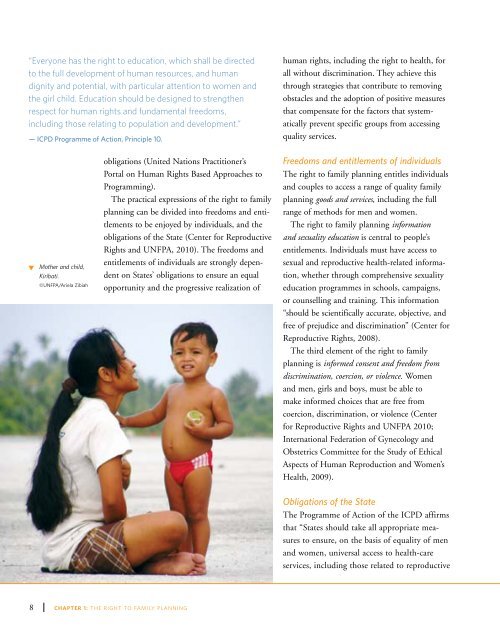State of World Population 2012 - Country Page List - UNFPA
State of World Population 2012 - Country Page List - UNFPA
State of World Population 2012 - Country Page List - UNFPA
Create successful ePaper yourself
Turn your PDF publications into a flip-book with our unique Google optimized e-Paper software.
“Everyone has the right to education, which shall be directed<br />
to the full development <strong>of</strong> human resources, and human<br />
dignity and potential, with particular attention to women and<br />
the girl child. Education should be designed to strengthen<br />
respect for human rights and fundamental freedoms,<br />
including those relating to population and development.”<br />
— ICPD Programme <strong>of</strong> Action, Principle 10.<br />
human rights, including the right to health, for<br />
all without discrimination. They achieve this<br />
through strategies that contribute to removing<br />
obstacles and the adoption <strong>of</strong> positive measures<br />
that compensate for the factors that systematically<br />
prevent specific groups from accessing<br />
quality services.<br />
t Mother and child,<br />
Kiribati.<br />
©<strong>UNFPA</strong>/Ariela Zibiah<br />
obligations (United Nations Practitioner’s<br />
Portal on Human Rights Based Approaches to<br />
Programming).<br />
The practical expressions <strong>of</strong> the right to family<br />
planning can be divided into freedoms and entitlements<br />
to be enjoyed by individuals, and the<br />
obligations <strong>of</strong> the <strong>State</strong> (Center for Reproductive<br />
Rights and <strong>UNFPA</strong>, 2010). The freedoms and<br />
entitlements <strong>of</strong> individuals are strongly dependent<br />
on <strong>State</strong>s’ obligations to ensure an equal<br />
opportunity and the progressive realization <strong>of</strong><br />
Freedoms and entitlements <strong>of</strong> individuals<br />
The right to family planning entitles individuals<br />
and couples to access a range <strong>of</strong> quality family<br />
planning goods and services, including the full<br />
range <strong>of</strong> methods for men and women.<br />
The right to family planning information<br />
and sexuality education is central to people’s<br />
entitlements. Individuals must have access to<br />
sexual and reproductive health-related information,<br />
whether through comprehensive sexuality<br />
education programmes in schools, campaigns,<br />
or counselling and training. This information<br />
“should be scientifically accurate, objective, and<br />
free <strong>of</strong> prejudice and discrimination” (Center for<br />
Reproductive Rights, 2008).<br />
The third element <strong>of</strong> the right to family<br />
planning is informed consent and freedom from<br />
discrimination, coercion, or violence. Women<br />
and men, girls and boys, must be able to<br />
make informed choices that are free from<br />
coercion, discrimination, or violence (Center<br />
for Reproductive Rights and <strong>UNFPA</strong> 2010;<br />
International Federation <strong>of</strong> Gynecology and<br />
Obstetrics Committee for the Study <strong>of</strong> Ethical<br />
Aspects <strong>of</strong> Human Reproduction and Women’s<br />
Health, 2009).<br />
Obligations <strong>of</strong> the <strong>State</strong><br />
The Programme <strong>of</strong> Action <strong>of</strong> the ICPD affirms<br />
that “<strong>State</strong>s should take all appropriate measures<br />
to ensure, on the basis <strong>of</strong> equality <strong>of</strong> men<br />
and women, universal access to health-care<br />
services, including those related to reproductive<br />
8 CHAPTER 1: THE RIGHT TO FAMILY PLANNING
















